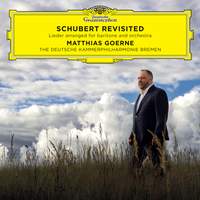Recording of the Week,
Schubert Revisited from Matthias Goerne
Matthias Goerne’s recordings of Schubert lieder with such luminaries as Alfred Brendel, Elisabeth Leonskaja and Graham Johnson are all real desert-island stuff for me, so the stakes were high when this new album entitled ‘Schubert Revisited’ landed in my inbox shortly before the festive break. The German baritone’s companion this time around is Alexander Schmalcz, who partnered him on the glorious Nacht und Träume twelve years ago, but there’s a twist – Schmalcz appears here in his capacity as arranger rather than pianist, with the Deutsche Kammerphilharmonie Bremen bringing his bespoke orchestrations of nineteen songs to life.
 Having heard Goerne perform a sizeable chunk of this programme in a magical recital with Icelandic pianist Víkingur Ólafsson (a partnership I fervently hope will be cemented in the studio) in December, I must admit that was a little hesitant to break the spell the two had woven by hearing him in upscaled versions just yet – but I needn’t have worried. Schmalcz’s orchestrations never seek to gild the lily or to push the singer into the more operatic form of delivery that’s practically demanded by the likes of Liszt and Berlioz in some of their arrangements: textures are beautifully uncluttered, leaving Goerne free to sculpt and colour phrases with the same subtlety and intimacy that made that London concert with Ólafsson so special.
Having heard Goerne perform a sizeable chunk of this programme in a magical recital with Icelandic pianist Víkingur Ólafsson (a partnership I fervently hope will be cemented in the studio) in December, I must admit that was a little hesitant to break the spell the two had woven by hearing him in upscaled versions just yet – but I needn’t have worried. Schmalcz’s orchestrations never seek to gild the lily or to push the singer into the more operatic form of delivery that’s practically demanded by the likes of Liszt and Berlioz in some of their arrangements: textures are beautifully uncluttered, leaving Goerne free to sculpt and colour phrases with the same subtlety and intimacy that made that London concert with Ólafsson so special.
Indeed, there are numerous moments where Goerne sounds like he’s enjoying more expressive freedom than ever: in songs like ‘Ganymed’ and ‘Abendstern’, he’s surrounded by a halo of string sound which even his most distinguished pianist partners would struggle to replicate, and even in the high-octane setting of ‘Erlkönig’ (one of the few songs where Schmalcz really brings out the big guns) the furious triplet ostinato which is usually hammered out by the pianist’s left hand seems to require less vocal muscle in response when transferred to the lower strings. (Although Schmalcz always appears to aim for authentically Schubertian orchestrations rather than tipping the wink to later composers, it’s impossible not to think of the opening storm of Die Walküre here, and seasoned Wagnerian Goerne responds thrillingly in kind…).
 It’s perhaps in the strophic songs that Schmalcz’s gift for bringing out colour pays the most dividends: each verse of ‘An Sylvia’ seems to catch the light slightly differently as new instruments step into the foreground, each new character encountered in ‘Alinde’ is clearly delineated. All his decisions seem firmly rooted in the little clues which Schubert and the poets he sets provide – rather than imposing a strong artistic personality on the music, Schmalcz simply gives us what’s been hiding in plain sight all along, dropping in pizzicato strings to evoke the pilgrim’s harp in ‘Pilgerweise’ or a solo oboe to bring the shepherd of ‘Schäfers Klagelied’ into 3D.
It’s perhaps in the strophic songs that Schmalcz’s gift for bringing out colour pays the most dividends: each verse of ‘An Sylvia’ seems to catch the light slightly differently as new instruments step into the foreground, each new character encountered in ‘Alinde’ is clearly delineated. All his decisions seem firmly rooted in the little clues which Schubert and the poets he sets provide – rather than imposing a strong artistic personality on the music, Schmalcz simply gives us what’s been hiding in plain sight all along, dropping in pizzicato strings to evoke the pilgrim’s harp in ‘Pilgerweise’ or a solo oboe to bring the shepherd of ‘Schäfers Klagelied’ into 3D.
As for Goerne himself, he sounds in prime vocal shape, and it’s clear that he’s absolutely in his comfort-zone with this music. There’s no evidence that his excursions into Wagner have caused any long-term wear-and-tear, and the voice sounds beautifully firm and integrated throughout its wide range - from the sonorous low D of ‘Der Tod und das Madchen’ to the floated high Es of ‘An Sylvia’. (Much of the programme lies in the upper reaches of his voice, and his elegant, easy way with repeated ascending phrases is an especial delight – try ‘Alinde’ and ‘Des Fischers Liebesglück’ for size).
In his insightful booklet-note Goerne writes affectionately of Schubert’s ability to strike ‘a perfect balance between intellectuality and the greatest naturalness’, and that same equilibrium is evident in every phrase of the performances here; rather than enlisting a conductor, Goerne has chosen to direct the orchestra himself (with the support of concertmaster Florian Donderer) and the DKB players respond to his simple eloquence and economy of musical gesture as one. Aside from the straightforward pleasure of hearing a great artist revisiting material he clearly adores, this wonderful album suggests several exciting possibilities to me – that Goerne may continue to explore his obvious potential as a conductor, and that Schmalcz might turn his adroit, idiomatic hand to Winterreise or Die schöne Müllerin…
Schubert Revisited is released next Friday on Deutsche Grammophon.
Matthias Goerne (baritone), Deutsche Kammerphilharmonie Bremen
Available Formats: CD, MP3, FLAC, Hi-Res FLAC



